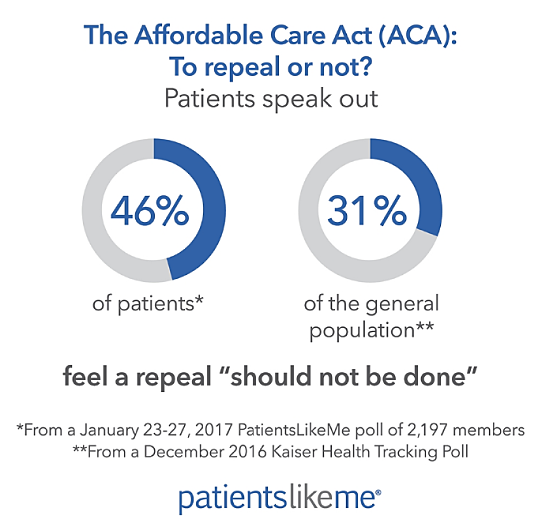Well over half of the respondents in a survey assessing patient priorities for a new healthcare law say the Affordable Care Act (ACA) — also known as Obamacare — has helped people living with fibromyalgia and other chronic diseases.
PatientsLikeMe carried out the large-scale poll in late January, against the backdrop of the new Trump administration and a Republican-controlled Congress, both of which have pledged to dismantle Obamacare. The survey polled 2,197 respondents among an estimated 133 million Americans living with chronic health conditions.
Sally Okun, vice-president of advocacy, policy and patient safety at the Massachusetts-based patient network and research platform, said the poll aims to provide a voice to those likely to be most heavily affected by changes to the ACA.
“Regardless of your political leaning, the great equalizer is that we’ll all become sick one day,” Okun said in a press release. “At this time of uncertainty about the future of healthcare, listening to the voice of patients today will illuminate the path forward for all of us.”
Among the poll’s key findings:
• 57 percent of respondents believe the ACA has helped people with chronic diseases.
• 46 percent think the ACA only needs minor changes to be improved.
• In the last year, the respondents’ out-of-pocket healthcare expenses have either remained the same (47%) or increased (43%).
• Lowering healthcare costs is a priority for both chronic disease patients and the general public, which was surveyed in a Henry J. Kaiser Family Foundation Health Tracking Poll in December. Lowering costs individuals pay for healthcare is a key priority for 94 percent of patients and 93 percent of the general population, while lowering prescription drug costs is a top priority for 96 percent and 89 percent of each group, respectively.
• 46 percent of PatientsLikeMe respondents believe the ACA should not be repealed, while only 31 percent of the Kaiser poll general population felt that way.
Interestingly, 59 percent of people with major depressive disorder (MDD) said the ACA should not be repealed, as opposed to 45 percent of overall respondents and just 31 percent of the general population. In addition, 42 percent of those with MDD were against cuts to federal spending on healthcare, compared to 29 percent of the overall patient population and only 18 percent of the general population.
Okun suggested that MDD patients may have a stronger opinion regarding healthcare law, given the Paul Wellstone and Pete Domenici Mental Health Parity and Addiction Equity Act (MHPAEA) passed in 2008 by Congress and codified in 2013 into rules that ensure equal treatment coverage for addiction and mental illness.
Of the 2,197 respondents completing the 19-question survey, 13 percent had multiple sclerosis as their primary medical condition, followed by fibromyalgia (12%), Parkinson’s disease (6%), MDD (5%), amyotrophic lateral sclerosis (5%), type 2 diabetes (3%) and multiple myeloma (3%).
Asked about their political leanings, 37 percent of respondents identified as Democrats, 19 percent as Republicans, 15 percent as independents and 4 percent as Libertarians. Another 11 percent were unaffiliated with any political party, and 13 percent declined to answer the question.


